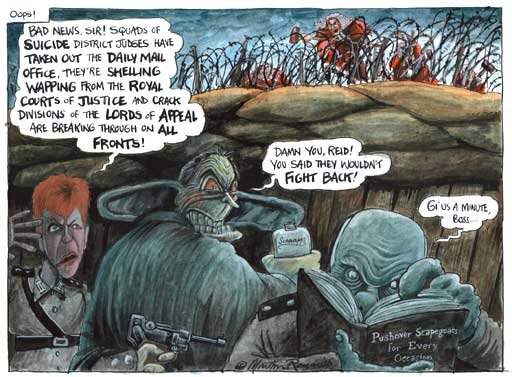Criminal justice.
 I posted this as a comment yesterday on the Comment is Free site. This is a slightly revised version.
I posted this as a comment yesterday on the Comment is Free site. This is a slightly revised version.Blair's speech, which is worth reading in full, is a lot better than he'll probably be given credit for. Yet nowhere in it, despite all his talk of the civil liberties and human rights of the victim and rebalancing does he talk about the presumption of innocence. The one right which a lot of people would consider to be absolutely inalienable is to be innocent until proved guilty. Nowhere does Blair state that he agrees with this. That is the problem with the proposed increase in summary justice and interim anti-social behaviour orders; the use of which will no doubt soon be given to the usual suspects, whether they actually are committing the supposed offences or not. Once you've been fingered, it leaves the problem that you become known, and it's far easier to go after them.
Take the story I was told today: A friend of mine who works on a market stall has a son who's known to the police. His son smokes, and there's very little that he can do to stop him from doing so. A police car drove by his son and saw him smoking, and as they know he's 15, the officer jumped out and ordered the teenager to give him the tobacco. He threw it to a friend who is over 16, but the police officer was having none of it. He grabbed the 15-year-old, and put his arm behind his back. The boy proceeded to tell him to get off and told him to "fuck off". The officer said right, that's disorder, you're under arrest. He kneed the teenager in the back of his legs to put him to ground and cuff him, but kept holding his arm. The result? The officer broke the boy's arm around the elbow, and he's had to have pins put in to correct the break. All because the person in question, who was minding his own business, was "known". Somehow I think that the police have a lot more important things to be doing than trying to stop 15-year-olds smoking.
Anyway, I digress. Blair's speech is delivered in the usual way in that what he says is so compelling and seems balanced and right that it's difficult to disagree with. Yet while he makes some welcome points about easy solutions, such as those advocated by the Sun, the repeal of the Human Rights Act, naming, shaming and blaming judges as completely missing the point, he only recognises the instances in which the current ASB legislation has worked. He doesn't admit to the sufferers of mental illness and behavioural problems who have been criminalised, the beggars and prostitutes served them that have done nothing illegal. And he goes back to his age-old excuse of blaming the opposition and those who have dared to "water down" his legislation, when all they've done is do exactly what their job is; to review legislation and stop the government of the day from abusing their powers.
Most people recognise that there are problems with drug dealers and crack houses, and few people have disagreed with those parts of the legislation which have gone through. Yet the emphasis on "shaming", which itself is part of the tabloid agenda he rejects is nearly always counter-productive. Where local police forces, like Thames Valley introduced softly-softly approaches to crimes such as shoplifting, where they made offenders meet managers of supermarkets, they are criticised for being politically correct by the same newspapers that Blair does so much to woo. As a result the shops themselves introduced civil recovery schemes, demanding huge sums from those who stole in the first place because they have little money or other problems. The likes of Tesco demanding money in the regions of hundreds of pounds from teenagers who stole a couple of chocolate bars isn't decried as greed. It's rather common sense.
Blair points out that those with drug problems and mental health problems litter our prisons. Yet he doesn't suggest that prison isn't the best place for them, and that more secure hospitals should perhaps be built to house them instead. While drug treatment programmes have admirably been much better funded in recent years, more still needs to be done. Blair's point that they need to made compulsory and with repercussions if they're broken is welcome, but there need need to be as many carrots as there are sticks. As for those with mental ill health, he seems more likely to bow to the tabloids and build yet more prisons. He talks of the voluntary sector being given more involvement in the probation system, without mentioning the attempt by Charles Clarke to privatise that exact system, which would have left companies deciding whether it should keep offenders in prisons run by themselves for profit. There is no acknowledgement of the conflict of interest in such a scheme, which still has not been ruled as dead.
He deserves to be listened to. He makes some salient points. But while he continues to criticise those who suggest that we should stand back, let the current reforms to the system settle and become more rational about the debate on crime, he continues to play to those who he denies pandering to: the hysterical tabloid press. Blair's allegiance to Murdoch is going to end in tears, but he can't accept that inevitability yet. His moves should be seen in that light, and the most objectionable should be rightly rejected.
Other posts on same subject:
Tales from the real world - Big Stick Small Carrot
A decent (*shock*) article by Martin Kettle
The Great Law 'n' Order Debate - Lenin's Tomb





